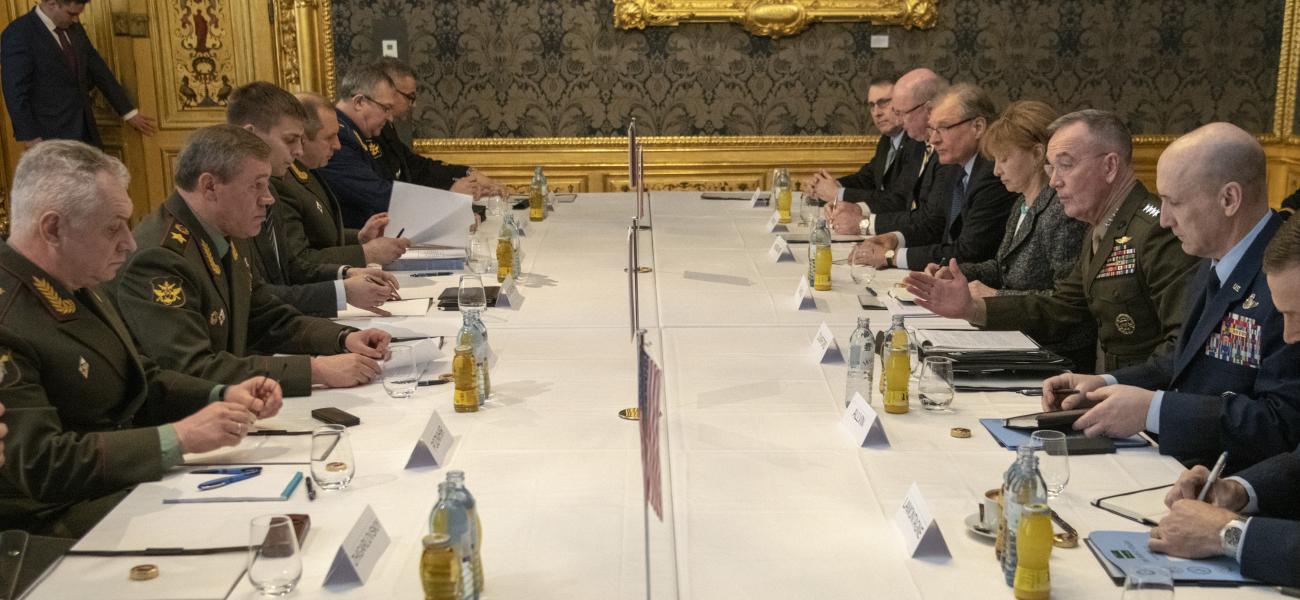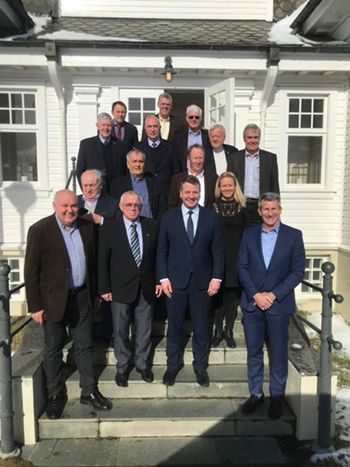In the Thick of It
A blog on the U.S.-Russia relationship
'Track 2' Talks Take US-Russian Relations Where Official Channels Won’t
Photo above shows Chairman of the Joint Chiefs of Staff Gen. Joseph Dunford meeting with Chief of the Russian General Staff Gen. Valery Gerasimov in Vienna on March 4, 2019.

When Russia’s Defense Ministry hosts representatives of 100 countries at its annual conference on international security this week, one group will be conspicuously absent: The U.S. and its NATO allies have reportedly decided not to delegate anyone to this year’s event. With relations between Moscow and the alliance all but frozen, “Track 2” discussions between the U.S. and Russia have become especially important. That’s where the Elbe Group comes in: The influential group of retired senior military and intelligence officers from Russia and the United States gathered in Reykjavik last month for an intimate discussion of pressing security issues affecting the U.S.-Russian relationship. They argued in a joint statement that obstacles to bilateral cooperation “should be reduced or eliminated” and that the U.S. and Russia “bear a special responsibility to negotiate and abide by agreements that ensure strategic stability.” The group also called for a “broadened dialogue on the future of U.S.-Russian relations” that takes into account new technological, military and strategic realities. The 13 delegates to the Reykjavik meeting included: from the U.S. side, former Defense Intelligence Agency director Michael Maples, former defense attache to Moscow Kevin Ryan and Belfer Center Intelligence Project director Rolf Mowatt-Larssen, a CIA veteran; from the Russian side, former Interior Minister Anatoly Kulikov, former head of military intelligence Valentin Korabelnikov and former acting head of the Federal Security Service Anatoly Safonov.
Below are the group’s conclusions on strategic stability, counterterrorism in the Greater Middle East and Central Asia, NATO-Russia relations, cyber and Arctic issues.
Strategic Stability
- “There is no alternative to negotiation.”
- “We recommend the governments of the United States and the Russian Federation issue directive instructions to resume contacts and interaction between the national security and military establishments.”
New START
U.S. Elbe Group members speaking at an event this month expressed concern that despite the impending expiration of the New Strategic Arms Reduction Treaty in 2020, there has been little headway toward talks on next steps. On April 12, two dozen Democratic senators urged President Donald Trump to extend the treaty. The Elbe Group also favors extension, calling on both sides to consider an “immediate start of negotiations”:
- The Russian and American Elbe delegations agreed that we do not want to be in a position where there are “absolutely no controls over nuclear weapons between the two countries” and therefore argued that both sides must do everything possible to “jumpstart talks on New START,” as “nobody has been moving toward negotiations,” the U.S. group members reported. The question that remains is which side will start the process.
- In its joint statement, the Elbe Group argued that “[t]he lack of agreement on … the reduction of strategic offensive weapons can have a negative impact on the future of the non-proliferation regime.”
INF Treaty
In light of the suspension of the Intermediate-Range Nuclear Forces Treaty, the group encourages the two governments to “consider the possibility of preserving the fundamental provisions of the INF Treaty for the future.” While the American and Russian delegations could not agree on the facts regarding alleged treaty violations, they did agree that the INF Treaty has been an “important instrument in providing stability” and, if there’s any way possible, they should try to save some of its elements.
More broadly, in the preamble of its joint statement, the Elbe Group urged the preservation and strengthening of arms control mechanisms as a way to address concerns about new non-nuclear technologies. The group encouraged “a broadened dialogue on the future of U.S.-Russian relations that considers new paradigms for updating mutual constraints on strategic systems, taking into account the emergence of new weapons and emerging technologies.”
Countering Terrorism in the Greater Middle East
The eminent U.S. diplomat William Burns recently named Afghanistan and Syria as possible areas of coordination between Russia and the United States. Elbe Group members saw even broader possibilities for cooperation:
- They urged both sides to focus on creating “a broad international antiterrorist coalition in the entire Middle East region,” calling attention to “the ongoing U.S.-Russian efforts to deconflict operations against ISIS in Syria as a basis for broader efforts to combat terrorism.”
- “In order to prevent the revival of ISIS, the military-to-military and special services’ cooperation between our countries should be resumed, both at the planning stages (preventive measures) and at the stages of direct implementation of the decisions taken.”
- “In order to prevent a humanitarian catastrophe in the region, and above all in Syria, the Russian side proposes to the U.S. side to resume its participation in international efforts to resolve the Syrian conflict.”
- “We encourage U.S.-Russian efforts to share information and work cooperatively carrying out the ‘duty to warn’ about impending terrorist attacks.”
More generally, the group “resolved to increase joint deconfliction and coordination efforts” with the aim of a “unified campaign to defeat radical Islamic terrorism” and its “ideologies.” In this context, the group discussed Central Asia at some length. According to the U.S. participants presenting on the meeting earlier this month, the Russian delegates indicated that they are “very interested” in a stable Afghanistan and, like the United States, do not wish to see a resurgence of terrorism there. Russia is “deathly afraid of terrorism in Central Asia” and believes that “open borders in Central Asia are a disaster waiting to happen for them,” said one of the presenters, as they are “concerned about foreign fighters, where they are, and where they’re going to go, where they’re going to hit next.”
NATO-Russia Relations
While the Russian government recently announced that it is ceasing all cooperation with NATO, the Elbe Group took a different approach. The American delegates said their Russian counterparts were “less strident about NATO than they have been in the past,” and the group called NATO-Russia relations “an element of strategic stability” and encouraged more communication and transparency between Moscow and the alliance:
- The group called on both sides “to significantly reduce the activity of operational and combat training of [their] armed forces … in the close proximity of the border between Russia and the NATO countries.”
- The Russian delegation suggested that both parties resume the practice of inviting “military observers to maneuvers and exercises of the armed forces of NATO and Russia.”
- “The NATO-Russia Council should prioritize discussions on risk reduction and military transparency in the Baltic and Black Sea regions, where an accident could escalate the situation, with unintended dangerous consequences.”
- “Improved NATO-Russia relations should include regular military-military contacts,” including “staff-staff contacts and the return of the Russian liaison cell to SHAPE headquarters in Mons, Belgium.”
U.S. delegates also reported that military buildup around Kaliningrad and the Suwalki Gap is a major point of concern for the Russian members of the group.
Cyber
Cyber has played a prominent role in U.S.-Russia relations of late, from the indictment of Russian officials via the Mueller investigation to the Julian Assange case. U.S. delegates to the Reykjavik meeting said their Russian counterparts denied that Moscow was involved in trying to affect the outcome of the 2016 American presidential election. At the same time, they said, the Russians did seem to have “a real desire to establish some kind of mechanism to discuss norms” regarding cybersecurity, specifically as it pertains to crime and terrorist activity. Elbe Group members offered their opinions on the broader issue:
- “Recognizing the increasing economic, social, and political importance of the Internet, the Elbe Group recommends mutual cessation of hostile use of the Internet in the social and political spheres and use of the Internet by Islamic extremists. There should be joint examination of software weaknesses exploited by criminals and shareware cryptography used in terrorist communications.”
In its joint statement, the group said that the U.S. and Russia “should agree not to interfere in the internal affairs of the other by cyber means or through information and influence operations.” The group also urged the rescheduling of previously cancelled bilateral discussions on cybersecurity.
The Arctic
At this month’s International Arctic Forum in St. Petersburg, Russian President Vladimir Putin announced Russia’s latest plans on Arctic development. The Elbe Group suggested how Russia and the U.S. could work together in the region:
- By preserving and developing “agreements reached within the framework of the Arctic Council”;
- By resuming “the practice of working meetings to discuss cooperation in the Arctic zone” between the head of Russia’s General Staff and the chairman of the U.S. Joint Chiefs of Staff, “including maintaining interaction in the Arctic zone between representatives of the Coast Guards of Russia and the United States.”
U.S. delegates to the Reykjavik meeting noted that there are still concerns about “who owns what” in the Arctic, but that Russia places great faith in the U.N. and its ability to resolve potential disputes. They also noted that Russia is “very pleased with the direction that they [Russia] are going right now in the Arctic.”
Top photo by Navy Petty Officer 1st Class Dominique A. Pineiro.
Inset photo courtesy of the Intelligence Project at Harvard's Belfer Center for Science and International Affairs.
The opinions expressed in this commentary are solely those of the author.

